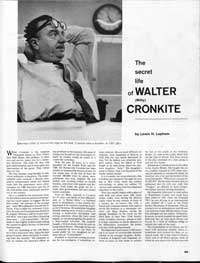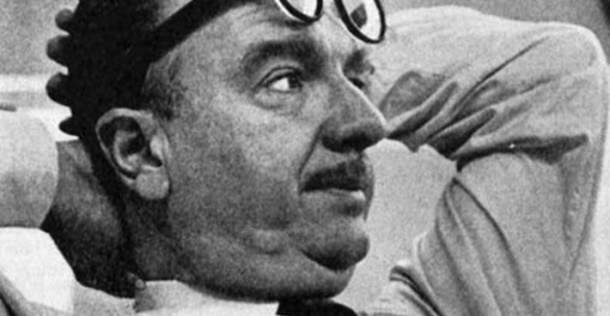“He was known for his courage as a correspondent in World War II, as a man always ready to take a chance. He went on eight bombing missions over Germany, crash-landed in a glider at the Battle of the Bulge, and accompanied the first allied troops into North Africa. ‘I was very brave,’ he says, ‘only because I did everything once, before I knew how hard it really was.’ ”
Written by Lewis Lapham “The Secret Life of Walter (Mitty) Cronkite,” was published in the March 16, 1963, issue of The Saturday Evening Post.
A generation of Americans must be wondering about Walter Cronkite, who made his last regular newscast in 1981. Why is he remembered so fondly by many Americans? Why was he once voted “the most trusted man in America,” and who has won that title in recent years?
Lapham’s article on Cronkite probably can’t answer these questions. However, it offers some interesting details about the man and hints at why many Americans came to trust what he said.

“Over the past 20 years, as a correspondent for the United Press and for CBS, the 46-year-old Cronkite has been present at innumerable historic events. In one recent year, in the line of duty, he traveled 300,000 miles by plane, auto, submarine and even dogsled. He has landed with invading troops on hostile beaches, conversed with queens and dictators, lived under the polar ice for a week, seen governments fall and atomic bombs exploded. …
“Cronkite is renowned among journalists for his prodigious if sometimes erratic, memory. He can recall offhand, for instance, what happened at Smyrna in 1922 [the city was nearly destroyed by fire]. Yet he seldom can remember people’s names. Once he talked at fond length to an interviewer about his newborn daughter, “Judy.” His daughter’s name is Nancy. Judy was the name of the family’s cocker spaniel. …
“He frequently takes part in road rallies in Westchester County and could have been killed in 1961 when the Triumph TR-3 he was driving in an international rally skidded off a road in the Great Smoky Mountains of Tennessee. The car pitched over an embankment and fell end over end into a lake 100 feet below. Cronkite emerged wet but unhurt. …
“He is … determined to make his show as estimable as possible, even though he is conscious of the weaknesses inherent in TV news. ‘It can’t be anything but a front-page service,’ he said, looking out the window. ‘There just isn’t time enough to give more than a few headlines and then hope that people will read the next morning’s paper. Compared to a newspaper the fifteen-minute broadcast, mine or anybody else’s, is a paltry sideshow.’ He proposed the hypothetical example of two men locked inside windowless rooms for a year, one receiving a newspaper every day and the other a daily television broadcast. ‘At the end of that time,’ Cronkite remarked, ‘the guy who had been watching television would come out with a damn strange idea of what had happened in the world.’ …
“Cronkite’s detractors usually criticize him for this unwillingness to advance an outspoken opinion. They complain that he is too polite, too bland, too dull. He considers the criticism unreasonable. ‘Probably if I made a few more acerbic remarks, 1 might win a few more viewers,’ he concedes, ‘but I don’t feel like being funny with the news; 1 don’t think that’s my place.’ …
“Was there anything he hadn’t done that he still would like to do? ‘I’d like to see Hong Kong, Oslo and Addis Ababa,’ he answered. ‘For some damn reason I’ve never managed to get to those cities.’ But just then … another idea captured Cronkite, and he smiled wistfully, as Walter Mitty is said to have smiled, ‘Or maybe, it might be possible, you know, to go to the moon. Can you imagine how great it would be to say to an audience, “Good evening, ladies and gentlemen, this is Walter Cronkite, reporting for CBS direct from the surface of the moon”?’ ”
On July 21, 1969, he was able to do the next best thing.
And that’s the way it was.
Read on, click here to read the PDF.
Become a Saturday Evening Post member and enjoy unlimited access. Subscribe now




Comments
Just read the wonderful article on Walter Conkite. I, like so many, grew up watching the much beloved Walter. However I did not know he had children. Why, did it not mention them as survivors upon his death.
Such a wonderful legacy.
Well said, Jeff. Uncle Walter was “there” for many of the milestones in my life, and will always be fondly remembered.
Compared to what we have today, Cronkite seems a paragon of objectivity.
Back in the day, however, I knew him to be a dedicated liberal.
Fortunately for him, he possessed a superior speaking voice and looked a lot like the much-beloved Walt Disney.